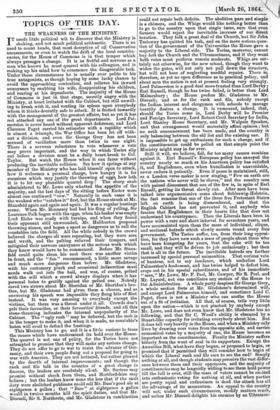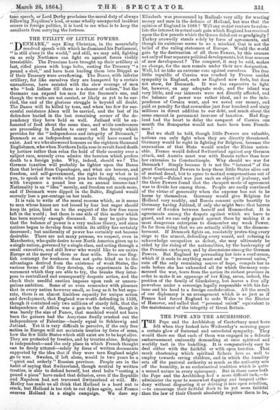TOPICS OF THE DAY.
THE WEAKNESS OF THE MINISTRY.
IT needs little political wit to discover that the Ministry is shaking, and not much political arithmetic. There is no need to count heads, that most deceptive of all Conservative amusements, or even to watch the drift of the local constitu- encies, for the House of Commons is in that temper which always presages a change. It is as fretful and nervous as a man who knows he must quarrel with his colleagues, and is making up his mind how to commence the disagreeable task. Under those circumstances he is usually over polite to his true antagonists, as though hoping by some lucky chance to avoid the approaching contention, and relieves his inward annoyance by snubbing his wife, disappointing his children, and roaring at his dependents. The majority of the House of Commons is just in that stage, secretly angry with the Ministry, at heart irritated with the Cabinet, but still unwill- ing to break with it, and venting its spleen upon everybody whom it thinks decently safe to attack. It is fretted inwardly with the management of the greatest affairs, but as yet it has not attacked any one of the great departments. Lord Pal- merston is never heard without apparent deference, and Lord Clarence Paget carried his estimates with a rapidity which is almost a triumph, the War Office has been let off with- out a division, and even Sir George Grey has not been accused of vacillation more than twice in one night.
There is a nervous reluctance to vote whenever a vote may prove important, and the way in which Tories slip out before a division must be a daily heart-break to Col.
Taylor. But watch the House when it can fume without producing the inevitable collision. See how it springs at any member of the Ministry who has laid himself open to attack, how it welcomes a personal charge, how hungry it is for occasions which may justify the throwing of eggs, how loth it is to let any plausible quarrel drop ! The sharp snub administered to Mr. Lowe only whetted the appetite of the majority, and the last days of the sitting before Easter were almost one continued "row." Naturally in such cases it is the weakest who "catches it" first, but the House struck at Mr. Stansfeld again and again and again. It was a regular hustings scene. When Mr. Hennessy had had his fling of yelling, Sir Laurence Palk began with the eggs, when his basket was empty Lord Elcho was ready with turnips, and when they found their opponent still unwounded, Mr. Haliburton proposed throwing stones, and began a sport so dangerous as to call the constables into the field. All the while nobody in the crowd believed the charges all were repeating, but they were sore and wroth, and the pelting relieved their tempers, and mitigated their nervous annoyance at the serious work which they knew would have to be commenced. Before Mr. Stens- feld could quite clean his coat there was another victim in front, and the "fun" recommenced, a little more savage and much more dangerous than before. Mr. Gladstone, with his customary pluck and occasional indiscretion must needs walk out into the hail, and was, of course, pelted with the will which a crowd always displays when it has personal hates to gratify against the pelted one. Nobody cared two straws about Mr. Sheridan or Mr. Sheridan's bro- ther, but Mr. Gladstone had given them a chance, and as answering his speech was impossible they flung bits of flint instead. It was very amusing to everybody except the victims, but there was a threat under it all. Crowds don't pelt their favourites, or their favourites' friends, and all this stone-throwing indicates the internal unpopularity of the Cabinet. The "ugly rush" may be deferred, but the mob is in the temper to make it, and when it is made, no constable's baton will avail to defend the hustings.
This Ministry has to go, and it is a little curious to trace the causes which have undermined its hold over the House. The quarrel is not one of policy, for the Tories have not attempted to promise that they will make any serious change. They do not offer to go to war to resist the advance of Ger- many, and their own people flung out a proposal for going to war with America. They are not irritated, but rather pleased by the dearth of internal improvements; and though the rank and file talk in the counties of a great change in finance, the leaders are resolutely silent. Mr. Surtees may promise without check from them, and Hertfordshire may believe ; but the leaders know none the less that if the malt duty were abolished publicans could sell Mr. Bass's good ale at eightpence a gallon ; that " Bass " at eightpence a gallon would in twelve months kill the spirit duties, and that Mr. Disrael.iFair S. Northcote, and Mr. Gladstone in combination could not repair both deficits. The abolition pure and simple is a chimera, and the Whigs would like nothing better than to go to the country upon that single issue, sure that even farmers would reject the inevitable increase of our direct taxation. They talk a great deal of the Church, but Sir John Trelawny has quitted his task, and on the more serious ques- tion of the government of the Universities the House gave a majority to the Liberal side. The Tories, moreover, cannot buy both the Church and the Ultramontanes, and if they want both votes must perforce remain moderate. Whigs are cer- tainly not otherwise, for the new school, though they want to widen the gates, will not only not pull down the structure, but will not hear of neglecting needful repairs. There is therefore, as yet no open difference as to practical policy, and about men the nation is not at present feeling very strongly. Lord Palmerston is a good deal more trusted than Lord Derby ; Earl Russell, though he has twice failed, is better than Lord Malmesbury ; the House prefers Mr. Gladstone to Mr. Disraeli; and as for the rank and file, nobody except the Indian interest and clergymen with schools to manage heartily desires a change. It is rumoured, indeed, that, should the Tories come in, Lord Derby will be Premier and Foreign Secretary, Lord Robert Cecil Secretary for India, Lord Stanley Home Secretary, and Mr. Walpole Speaker, and that arrangement would materially affect opinion ; but no such announcement has been made, and the country is only balancing between the old list and the existing one. It is impossible to get up enthusiasm for such a change, and if the constituencies could be polled on that simple point the Ministry might stay in for ever.
Still, it will, we believe, fall, for too many causes combine against it. Earl Russell's European policy has annoyed the country nearly as much as his American policy has satisfied it, and Englishmen, even when humiliation is unavoidable, never endure it patiently. Even if peace is maintained, still, as a London verse-maker is now singing, "Few on earth are the nations who never will be slaves," and the country sees with pained discontent that one of the few is, in spite of Earl Russell, getting its throat slowly cut. After men have been talked into argumentative coma about Schleswig-Holstein, the fact remains that one of the three free Protestant States left on earth is being dismembered, and that the English Cabinet has not prevented it, and anybody who fancies that Englishmen in their hearts like that does not understand his countrymen. Then the Liberals have been in power with a rare and short interval for seventeen years, and have accumulated upon them the mass of individual, clique, and sectional hatreds which slowly accrete round every free government. The Tories suffer, too, from their long opposi- tion, for they have now such a mass of people about them who have been hungering for years, that the cake will be too small, and they will be driven to job audaciously ; but then that is all in the future. The inevitable hatreds are further increased by special personal animosities. That curious vein of hauteur, not to say insolence, which underlies Lord Palmerston's bonhommie, and has twice helped to defeat him, crops out in his special subordinates, and of his immediate "men," Mr. Lowe, Mr. F. Peel, Mr. Cowper, Sir R. Peel, and Mr. Layard, not one conciliates any section of the House to the Administration. A whole party despises Sir George Grey, a whole section frets at Mr. Gladstone's determined will, and except Lord Palmerston himself, and sometimes Lord C. Paget, there is not a Minister who can soothe the House out of a fit of irritation. All that, of course, tells very little upon the nation—which is not pinched by anybody except Mr. Lowe, and does not even know that Mr. Gladstone has no following, and that Sir C. Wood's ability is obscured by a Stuart-like capacity for irritating everybody about him. But it does tell very heavily in the House, and when a Ministry only lives by drawing over votes from the opposite side, and carries economical votes by a majority of one, the House becomes as important as the constituencies. Finally the Ministry suffers bitterly from the want of zeal in its supporters. Except the Annuities Bill, what have they begun, or proposed to begin, or promised that if permitted they will consider how to begin of which the Liberal rank and file care to see the end? Simply nothing at all, and though students may perceive the vast differ- ence between them and their opponents, and the majority of constituencies may be languidly willing to see them hold power till the lull is over, still the mass of voters cannot be excited into enthusiastic voting for nothing at all, and when parties are pretty equal and enthusiasm is dead the attack has all the advantage of its momentum. An appeal to the country will not, under such circumstances, modify matters much, and unless Mr. Disraeli delights his enemies by an Ultramon- tune speech, or Lord Derby proclaims the moral duty of always following Napoleon's lead, or some wholly unexpected incident occurs in foreign politics, it is hard to see what is to keep the assailants from carrying the fortress.































 Previous page
Previous page